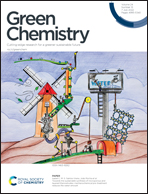Catalytic cooperativity between glucose oxidase and gold nanoparticles in the sequential oxidation of glucose to saccharic acid†
Abstract
There exists great potential in combining heterogeneous metallic nanoparticle active sites and enzymatic active sites for sequentially catalysed chemical transformations. This study provides an illustrative system where glucose oxidase and gold nanoparticles are successfully combined into a hybrid catalytic material. This multi-site catalyst is used to convert glucose to a more valuable saccharic acid product without the need for a strong oxidant such as H2O2, hypochlorite, or nitric acid to be externally added. We synthesise a hybrid material that is able to oxidise glucose to gluconic acid and H2O2 with glucose oxidase, and gold catalyses the further oxidation to saccharic acid. The in situ generation of H2O2 provides a proximal, dilute oxidizing agent for further oxidation. It is observed that higher pH promotes H2O2 decomposition and saccharic acid generation catalysed by the gold nanoparticles. A 33% yield of saccharic acid in 90 minutes is observed without the addition of nitric acid, harsh oxidants, above ambient temperatures, or high oxygen pressures. The results demonstrate a cooperative reaction cascade system that opens new possibilities for metal nanoparticle–enzyme hybrid materials that can be applied to catalytic biomass conversion in mild reaction conditions.



 Please wait while we load your content...
Please wait while we load your content...